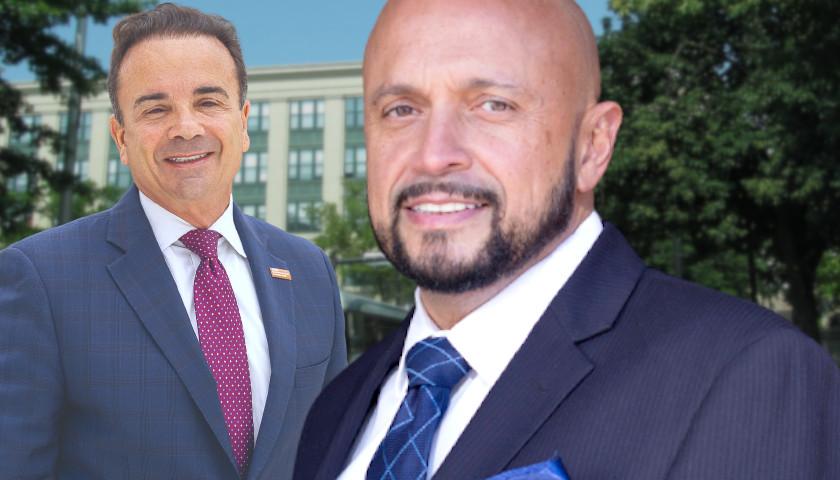by Christian Wade
Connecticut lawmakers are pushing to repeal or scale back a new mileage tax on tractor trailers that went into effect earlier this year amid the threat of a legal challenge over the requirements.
The new law, which went into effect on Jan. 1, requires commercial truckers to pay rates ranging from 2.5 cents per mile for trucks with a gross weight of 26,000 pounds to 10 cents per mile for trucks weighing 80,000 pounds. Trucks weighing more than 80,000 pounds are slated to pay 17.5 cents per mile under the new regulations.
But lawmakers are pushing back against the plans with a proposal that would phase out the tax by July, citing concerns it adds to the cost of consumer goods, including food, and will be hard to collect from out-of-state truckers. The proposal is being weighed by the Legislature’s Finance, Revenue and Bonding Committee, which held a hearing on the bill last week.
House Republican Leader Vincent Candelora, a primary sponsor of the repeal bill, said the Highway Utility Tax is unnecessary and “only add to the already high price of goods and services that businesses and constituents must pay.”
“The majority party blames the trucking industry, which consist of many small businesses here in Connecticut, for destroying our roads and highways,” he said in testimony. “However, the state has consistently forgone necessary maintenance and upgrades to keep our transportation system in a state of good repair.”
Another proposal filed by state Sen. Cathy Osten, D-Sprague, and other lawmakers would exempt trucks transporting agricultural commodities, machinery or supplies from the tax. Truckers transporting milk from dairy farms are already exempt.
State officials say the new tax has already drummed up $4.3 million during the first month of reported collections, much of it from out-of-state truckers. They expected the tax to generate more than $90 million annually, which will be used mostly for transportation projects aimed at blunting the impact of climate change.
But truckers say the new tax saddles them with additional expenses amid record high inflation and other pressures, and predict the higher costs would be passed onto consumers.
John Blair, president of the Motor Transportation Association of Connecticut, said his organization is among those that want the tax repealed. He said the levy has had an “immediate and direct impact” on truckers and consumers and adds to the “ever-increasing costs of doing business in Connecticut.”
“The sunsetting of this tax will reverse an otherwise inequitable tax scheme,” Blair said in testimony. “If this bill passes, it will afford some financial relief at a time when it is most needed.”
Trucking groups suggest the tax doesn’t pass legal muster, citing a recent federal court’s ruling that Rhode Island’s truck-only tolling program is unconstitutional.
Hundreds of truckers have submitted testimony in support of the repeal bill, many saying their livelihoods are on the line.
But supporters of the tax say truckers have an outsized impact on the state’s highways, and should provide more funding to keep them maintained.
“Trucks do the vast amount of damage to our highways and byways, not to mention the extra time and effort it takes to clean up accidents and toxic spills and the traffic jams created by those accidents,” one commenter wrote in testimony opposing a repeal of the tax. “The taxes on commercial trucks should be increased.”
Lamont administration officials are also defending the new tax, saying its repeal would result in a $30 million deficit in the state’s transportation fund beginning in the next fiscal year, which would impact projects. Money from the fund is used for highway upgrades, and other transportation needs, officials say.
“The loss of this revenue would not just put the Special Transportation Fund in deficit, it would also jeopardize the state’s ability to provide valuable investments to address congestion and maintenance throughout the state’s transportation network,” Jeffrey Beckham, secretary of Connecticut’s Office of Policy and Management, said in testimony.
Gov. Ned Lamont pushed the new tax through the Democratic-controlled state Legislature in 2021 near the end of the previous session. Its approval came over the objections of Republican lawmakers, who voiced concerns that the program was essentially a fuel tax increase that would saddle road users and business owners with more costs.
The move followed the collapse of a multi-state transportation pact aimed at reducing regional tailpipe emissions for both trucks and passenger vehicles.
– – –
Christian Wade is a contributor to The Center Square.
Photo “Truck Driver” by Veronica538. CC BY-SA 3.0.





